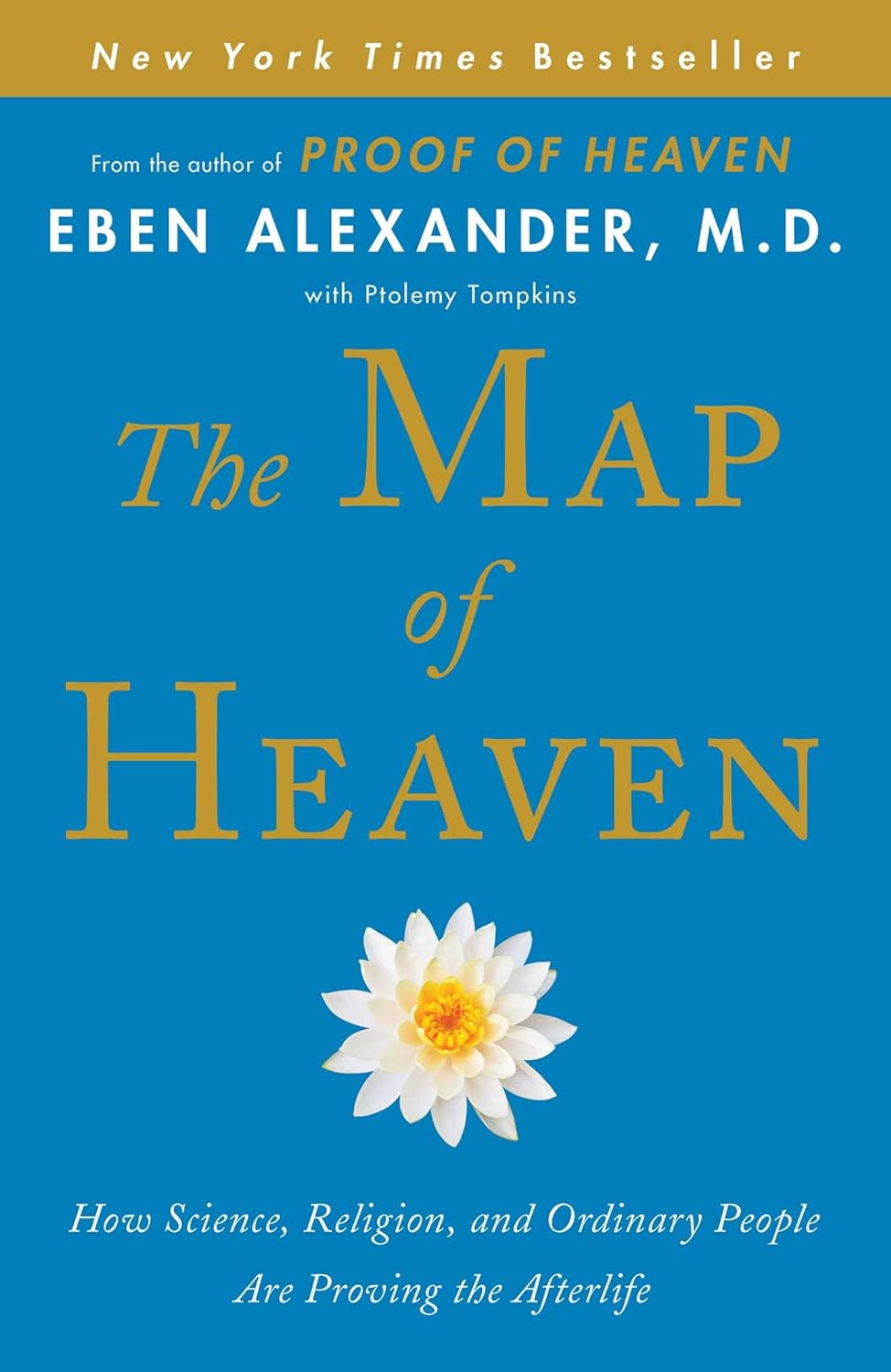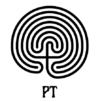The Map of Heaven
 Early in 2012, shortly after I had wrapped up work on The Modern Book of the Dead, I received a call from my then-agent about a potential ghost-writing project. My agent had been in contact with a former Harvard neurosurgeon named Eben Alexander, who wanted to tell the story of his seven-day near-death experience in a book.
Early in 2012, shortly after I had wrapped up work on The Modern Book of the Dead, I received a call from my then-agent about a potential ghost-writing project. My agent had been in contact with a former Harvard neurosurgeon named Eben Alexander, who wanted to tell the story of his seven-day near-death experience in a book.
The story was extraordinary. Eben, who had been stricken with gram-negative bacterial meningitis, lay in a coma for seven days, his chances of full recovery hovering around zero, and his chances of continuing to live at all, even in a vegetative state, hovering not that too far above that.
Everyone knows the rest of the story. Eben journeyed to a series of realms that he described with uncanny clarity and specificity – realms that, in his descriptions, struck me as having an extraordinarily archetypal quality. Strange shocks of recognition showed up all through Eben’s story. His was, I believed, a kind of myth for our time.
Fantastic as Eben’s story was, telling that story in the manner I thought it should be told wasn’t easy. In fact, over the next three months I basically drove myself (and those stuck in the same house with me), crazy as I struggled, using Eben’s monster of a manuscript, to transform that manuscript into a lean, readable story that would resonate with a popular audience.
As it turned out, the most valuable tool in producing the story was not Eben’s manuscript, which was a dry and often maddeningly confusing affair, but the series of taped conversations I had with him – conversations in which his story came to life in a way that it decidedly didn’t in his written account. Like many a Southerner, Eben is a good talker, a good teller of stories. Listening to his descriptions of the Spinning Melody that rescued him from the Realm of the Worm’s Eye View and his journey to the Core, where he spoke to a Being he was forthright enough to identify as God him/her/itself, it occurred to me that I had been handed a rather large and rather extraordinary responsibility. Eben’s wasn’t only the longest recorded contemporary Near Death Experience. It was also the most difficult to disprove, thanks to the fact that throughout the whole thing, Eben’s body was in a hospital, hooked up to every manner of monitoring device. And then there was the fact that Eben was himself a doctor – a “man of science,” as I liked to put it in the book. Getting Eben’s story out of his mouth and onto my computer screen was difficult, but throughout the process I had the strange but very definite feeling that the story I was banging out was one that might genuinely change things in terms of peoples’ views of death.
I wrote the majority of Proof of Heaven in bed, often with the residual spaciness of the previous night’s Ambien in my head. I have always been prone to anxiety, and when working on a book that anxiety always increases. With Proof of Heaven it intensified, pretty much, by the day. So sunk in the labor of producing the thing did I become that my days took on a sort of military sameness. Arise, drink a ton of coffee, start typing, go to the gym, go home, eat, go to sleep, repeat. So worked up about the whole business did I become that there was really no moment of my day when I wasn’t thinking, at least in the back of my head, about one or another aspect of the story, and how to make the whole thing fit into a single, neat package. Consequently, I had no patience for the evening hours – the ones after dinner was over when I was too tired to do any useful work, but unable to push the materials of the book out of my head. I wanted to be done with the evening and get started on tomorrow. Hence the Ambien. I came to rely on the stuff so much that once the book was done, I would joke that it should have been called Proof of Ambien. When, at last, I had isolated the core narrative and honed it down to a story that ran from A to Z, I felt a real sense of accomplishment. I had added nothing to Eben’s story, but I had turned it from a story into a book – a book with what I felt to be a certain universality to it; so much so that it was not just a book, but a kind of modern myth. A book written in my particular tone, by and large, and dealing with the same sorts of themes with which I had already been preoccupied for years. How on earth had I ended up being the one to receive this story and be tasked with its construction? It all seemed so weird, so unlikely.
And it was, too. Unlikely, that is. My agent, who initially had not instantly thought of me as rhe ideal ghostwriter for the book when Eben had contacted her, happened to have been shopping Eben’s story around to various New York publishers on the same day that the first copy of The Modern Book of the Dead had arrived at Simon & Schuster’s offices. At that point, everyone knew that Eben would need someone to tell his story. A writer would have to be found, but at that point the important thing was Eben’s story, not who would end up with the job of turning it into a book. As I heard it, someone handed Eben the sole and single copy of The Modern Book of the Dead then present at the publisher’s, and told him he could take it with him if he liked. Eben did, and that night he read it. The next day he announced that he had found the person for the job. As Eben told me at the time, The Modern Book of the Dead provided the “long view,” telling the story of people’s attitude to the afterlife through history. His story, in contrast, would give a direct, individual, personal account – a narrative that genuinely put forth what happens when the body and the brain give out, and the personal self leaves them behind.
The story told in Proof of Heaven is all Eben’s. I didn’t make anything up, massage any details to make for a better story. The story it tells is the one he gave me over our phone conversations, period. The book’s tone, however, is generally mine, and the same goes for its sequel, The Map of Heaven. Or rather it’s something slightly different than that. It’s me, pretending to be Eben, pretending to speak in his voice, but with all my tics and tricks, and all my perennial preoccupations, unstoppably making their way into the mix. Proof performed so well (I vividly remember the moment when, waking deep in the night, I checked my phone and saw that, after a long struggle, it had finally edged Bill O’Reilly’s Killing Kennedy out of Amazon’s number one slot) that everyone was anxious to put another Eben title out as soon as possible. Everyone, that is, but Eben. He initially told me, shortly after Proof came out, that he expected to say more, but that the process of figuring out what would constitute this “more” would be a lengthy one.
Sitting around and waiting for further inspirations and insights to arrive was not what the publisher wanted to do however. The marketplace being the fickle entity that it is, it would be entirely more sensible to get something out there fast, while people were still talking and thinking about the first book.
So… a new proposal was cooked up, and sold to Simon & Schuster. I – bottle of Ambien at my side – went back to bed and got back to typing. So it is that The Map of Heaven reflects, rather obviously, the usual bag of spiritual and philosophical concerns that I had been dragging around with me for years by that point. Arguments made in my previous books emerge and are laid out again, this time with plenty of “As a neurosurgeon” inserts to assure readers who was really saying all these things. Of course, Eben gave his thumbs-up to the whole thing, and while I think at certain points he grew a bit flustered at the degree to which I had seized the director’s chair, the points made in the book are all points that he signed off on. The only real complaint that I recall him having, at the end of the (once again extremely fast) writing process, was that I, busy as usual with the same images, ideas and themes that filled all my other books, had given short shrift to the binaural audio exercises that he and his now-wife market as tools to augment consciousness. This is reflected in the (to me at least) rather obvious difference in tone of the appendix, “The Answers Lie Within Us All,” which was written not by me but by Eben and his wife.
In the end, however, all of this is small potatoes. The important part of the whole business is what happened to Eben in the course of his week-long coma, and the ring of authenticity that the descriptions of the places and beings he encountered there have for anyone who has spent any time at all with the word’s spiritual literature. There came to me, at some point in my work on Proof of Heaven, the sudden insight that Eben’s story was not a story, one among others, but the central human story. One told in countless way by countless people in equally countless times and places over history and, most likely, long before it. The story of a soul who leaves this world behind for a time and returns to it with news of another, larger world that surrounds and upholds this one. From Gilgamesh to Dante, this is, quite simply, the most central human story there is. It is also a story that, as I learned long before I ever met Eben, can bear up very well under repetition.
